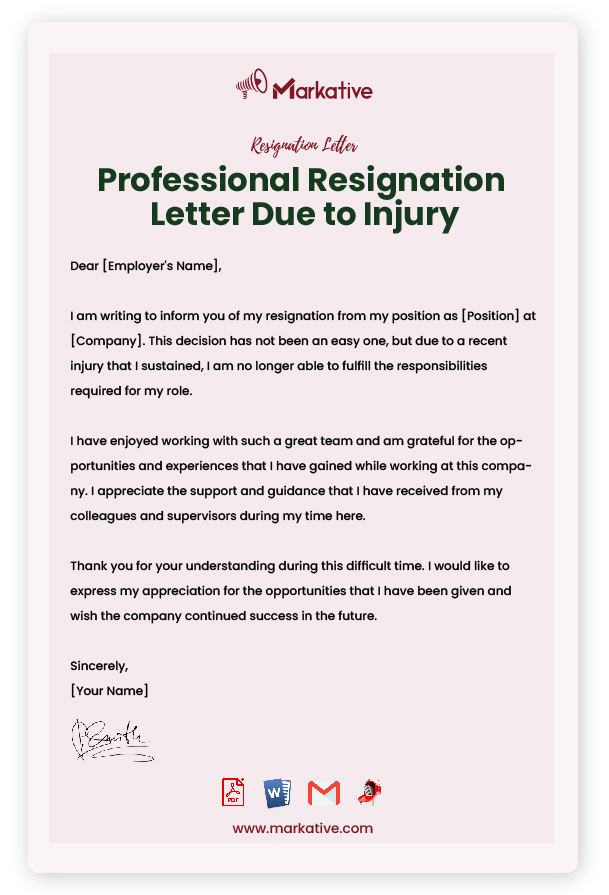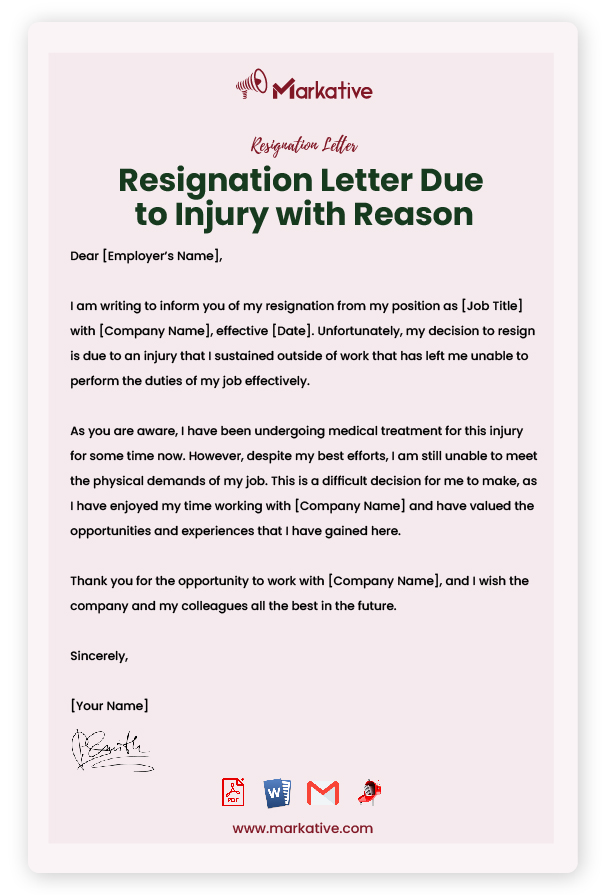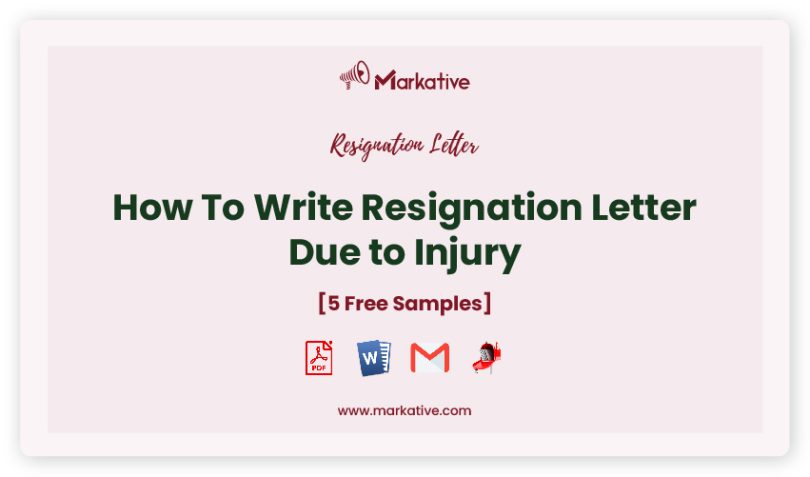Resignation is an important aspect of one’s professional life, and it should be treated with great care and attention. A resignation letter is a formal document that an employee submits to their employer when they have decided to resign from their position. It is an essential part of the resignation process and can have a significant impact on an individual’s career. A well-written resignation letter due to injury can convey a positive image of the employee and leave a lasting impression on the employer.
A good resignation letter can create a positive impact on an employee’s future job prospects. It can serve as a reference for future employers and can showcase the employee’s professionalism and dedication. It can also help the employee maintain a positive relationship with their employer, which can be beneficial for their career in the long run. A resignation letter due to injury can be especially important, as it can demonstrate the employee’s commitment to their health and wellbeing.
In this article, we will discuss the importance of writing a good resignation letter due to injury. We will provide tips on how to write a professional and impactful resignation letter that can leave a positive impression on the employer. We will also highlight the benefits of submitting a well-written resignation letter and how it can help an employee in their future career. Whether you are resigning due to an injury or for any other reason, this article will provide you with the guidance you need to ensure that your resignation letter is professional, effective, and impactful.
How To Write Appealing Resignation Letter Due to Injury?
If you have experienced an injury that prevents you from continuing your current job, you may need to write a resignation letter. Crafting a thoughtful and professional resignation letter is important for maintaining good relationships with your employer and colleagues. Here are 5 steps to help you write an appealing resignation letter due to injury, along with some examples.
- Start with a clear statement of resignation: Begin your letter with a clear statement that you are resigning from your position due to injury. This should be the first thing your employer sees when they open your letter.
Example: “Dear [Employer], I am writing to inform you that I must resign from my position as [Job Title] due to an injury that has made it impossible for me to continue working.”
- Explain the circumstances of your injury: Provide a brief explanation of the injury that has led to your resignation. This can help your employer understand why you are leaving and may help facilitate a smoother transition.
Example: “I have recently suffered a severe injury that has left me unable to perform the physical requirements of my job. While I am receiving treatment and hope to recover fully, I am unable to continue working in my current capacity.”
- Express gratitude and appreciation: Take the time to express gratitude and appreciation for the opportunity to work with your employer and colleagues. This can help leave a positive impression and maintain good relationships.
Example: “I want to express my deep gratitude for the opportunity to work with such a supportive and dedicated team. I have learned so much during my time here, and I will always value the friendships and professional connections I have made.”
- Offer to assist with the transition: If possible, offer to assist with the transition process to help ensure that your departure is as smooth as possible. This can include training a replacement or providing assistance with ongoing projects.
Example: “Please let me know how I can best assist with the transition process. I am happy to provide training or assistance with ongoing projects to help ensure a smooth handover of my responsibilities.”
- Close with a professional and positive tone: Close your letter with a professional and positive tone. This can include wishing your employer and colleagues all the best in the future and expressing a desire to stay in touch.
Example: “Thank you again for the opportunities and experiences I have had while working here. I wish you and the team all the best in the future and hope that we can stay in touch.”
Writing a resignation letter due to injury can be a challenging task, but following these 5 steps can help you craft a thoughtful and professional letter that leaves a positive impression. Remember to keep your tone professional and positive, express gratitude and appreciation, and offer to assist with the transition process if possible.

Professional Resignation Letter Due to Injury
Dear [Employer's Name], I am writing to inform you of my resignation from my position as [Position] at [Company]. This decision has not been an easy one, but due to a recent injury that I sustained, I am no longer able to fulfill the responsibilities required for my role. I have enjoyed working with such a great team and am grateful for the opportunities and experiences that I have gained while working at this company. I appreciate the support and guidance that I have received from my colleagues and supervisors during my time here. I understand that my resignation may cause inconvenience, and I apologize for any disruption this may cause to the company's operations. I will do everything in my power to ensure a smooth and efficient transition of my duties to my replacement. Thank you for your understanding during this difficult time. I would like to express my appreciation for the opportunities that I have been given and wish the company continued success in the future. Sincerely, [Your Name]
Resignation Letter Due to Injury with Reason
[Your Name] [Your Address] [City, State ZIP Code] [Your Email] [Date] [Employer’s Name] [Employer’s Address] [City, State ZIP Code] Dear [Employer’s Name], I am writing to inform you of my resignation from my position as [Job Title] with [Company Name], effective [Date]. Unfortunately, my decision to resign is due to an injury that I sustained outside of work that has left me unable to perform the duties of my job effectively. As you are aware, I have been undergoing medical treatment for this injury for some time now. However, despite my best efforts, I am still unable to meet the physical demands of my job. This is a difficult decision for me to make, as I have enjoyed my time working with [Company Name] and have valued the opportunities and experiences that I have gained here. I would like to take this opportunity to express my gratitude to you and the rest of the management team for your understanding and support during this challenging time. I have appreciated the flexibility and accommodations that have been made for me as I have sought to recover from my injury. Please let me know if there are any further steps that I need to take to facilitate a smooth and orderly transition of my duties to a successor. I am committed to ensuring that my resignation does not disrupt the smooth functioning of the company. Thank you for the opportunity to work with [Company Name], and I wish the company and my colleagues all the best in the future. Sincerely, [Your Name]
Resignation Letter Due to Injury without Reason
Dear [Employer's Name], It is with great regret that I am submitting my resignation from my position as [Job Title] at [Company Name], effective immediately. Due to unforeseen circumstances, I have sustained an injury that prevents me from performing my job duties to the best of my ability. While I am unable to disclose the specific details of my injury, please be assured that it is a serious matter that requires my immediate attention and treatment. Unfortunately, it also means that I am unable to continue working for the company at this time. I appreciate the opportunities and experiences I have gained during my time at [Company Name], and I am grateful for the support and understanding that I have received from my colleagues and superiors. Please let me know if there is anything else I can do to assist in the transition process, and please forward any necessary paperwork or documentation regarding my departure. Thank you for your understanding during this difficult time. Sincerely, [Your Name]
Urgent Resignation Letter Due to Injury Sample
[Your Name] [Your Address] [City, State ZIP Code] [Date] [Employer's Name] [Employer's Address] [City, State ZIP Code] Dear [Employer's Name], It is with regret that I must resign from my position as [Your Position] at [Company Name], effective immediately. This decision has been a difficult one, but it has become necessary due to a recent injury that I sustained, which has left me unable to continue performing my duties. As you may be aware, I sustained a [brief description of injury] while on the job on [date of injury]. Despite receiving medical treatment and taking time off work, my injury has not healed as expected and has left me unable to perform my duties safely and effectively. After careful consideration, I have come to the difficult decision that it is in the best interest of both myself and the company for me to resign from my position. I apologize for any inconvenience that my resignation may cause and appreciate the support that I have received during my time at the company. Please let me know the next steps for concluding my employment, including any outstanding tasks that need to be completed before my departure. I am willing to assist in any way possible to ensure a smooth transition. I appreciate the opportunities that I have had during my time at [Company Name], and I wish the company continued success in the future. Sincerely, [Your Name]
Simple Resignation Letter Due to Injury
Dear [Manager's Name], It is with a heavy heart that I must resign from my position as [Job Title] at [Company Name], effective [Date of Resignation]. Unfortunately, I have recently suffered an injury that has made it impossible for me to continue working at this time. I would like to take this opportunity to express my gratitude for the opportunities and experiences that I have had during my time at [Company Name]. It has been a privilege to work with such a dedicated and talented team, and I will always remember my time here with fondness. Please let me know what steps I need to take to ensure a smooth transition of my duties and responsibilities. I am willing to assist in any way possible to make this process as seamless as possible. Thank you for your understanding during this difficult time. I wish the company continued success in the future. Sincerely, [Your Name]
How Much Notice Should You Give for a Resignation Letter Due to Injury?
According to the National Safety Council (NSC), workplace injuries and accidents cost the US economy $171 billion in 2019. The Bureau of Labor Statistics (BLS) reported that there were 2.8 million nonfatal workplace injuries and illnesses in 2019. The construction, manufacturing, and healthcare sectors had the highest number of workplace injuries.
If you need to resign due to an injury, it is important to give your employer as much notice as possible. Depending on the severity of the injury, you may need to take time off work or require medical attention, which can affect your employer’s operations. It is recommended that you give at least two weeks’ notice for a resignation letter due to injury. However, if your injury is severe and requires immediate medical attention or if you are unable to work, you should inform your employer as soon as possible. It is also important to have a conversation with your employer about your rights and any available benefits or compensation that you may be entitled to.
Is it Ok To Email a Resignation Letter Due to Injury?
It is generally acceptable to email a resignation letter due to injury, especially if the injury prevents the employee from physically coming into work or if the employee needs to resign immediately due to medical reasons. However, it is recommended to also follow up with a phone call or in-person conversation with a supervisor or HR representative to ensure that the resignation is properly received and processed. For example, if an employee suffers a serious injury that requires extended medical treatment, they may need to resign via email to avoid delay in seeking medical attention. The employee should be clear and concise in their email, stating their intention to resign due to their injury and providing any necessary details about their situation.

Common Mistakes When Writing a Resignation Letter Due to Injury?
- Not being clear about the reason for resignation: When writing a resignation letter due to injury, it’s important to clearly state that the reason for resigning is due to the injury sustained. Be specific about the injury, the severity, and the impact it has on your ability to work.
- Not giving enough notice: It’s important to give your employer sufficient notice when resigning due to injury. Check your contract or company policy to determine the appropriate notice period and make sure to adhere to it. Failing to give enough notice can negatively impact your relationship with your employer and potentially affect future job opportunities.
- Not expressing gratitude: Even if the injury and circumstances surrounding your resignation may be unpleasant, it’s still important to express gratitude towards your employer and colleagues. Thank them for the opportunities and support provided during your time at the company, and express your regret for having to resign due to the injury. A gracious resignation letter can help maintain positive relationships and leave a good impression.
Conclusion:
Writing a resignation letter due to injury requires careful consideration and attention to detail. It is important to inform your employer of your decision in a clear and concise manner, and to follow proper protocol when it comes to sending the letter and providing notice. Common mistakes, such as being too emotional or not giving enough notice, should be avoided.
Additionally, utilizing a pre-made template can be a helpful tool in crafting a professional and effective resignation letter. Whether you choose to use one of the templates provided or create your own, remember to keep your communication respectful and professional, and to prioritize your own health and well-being throughout the process.







